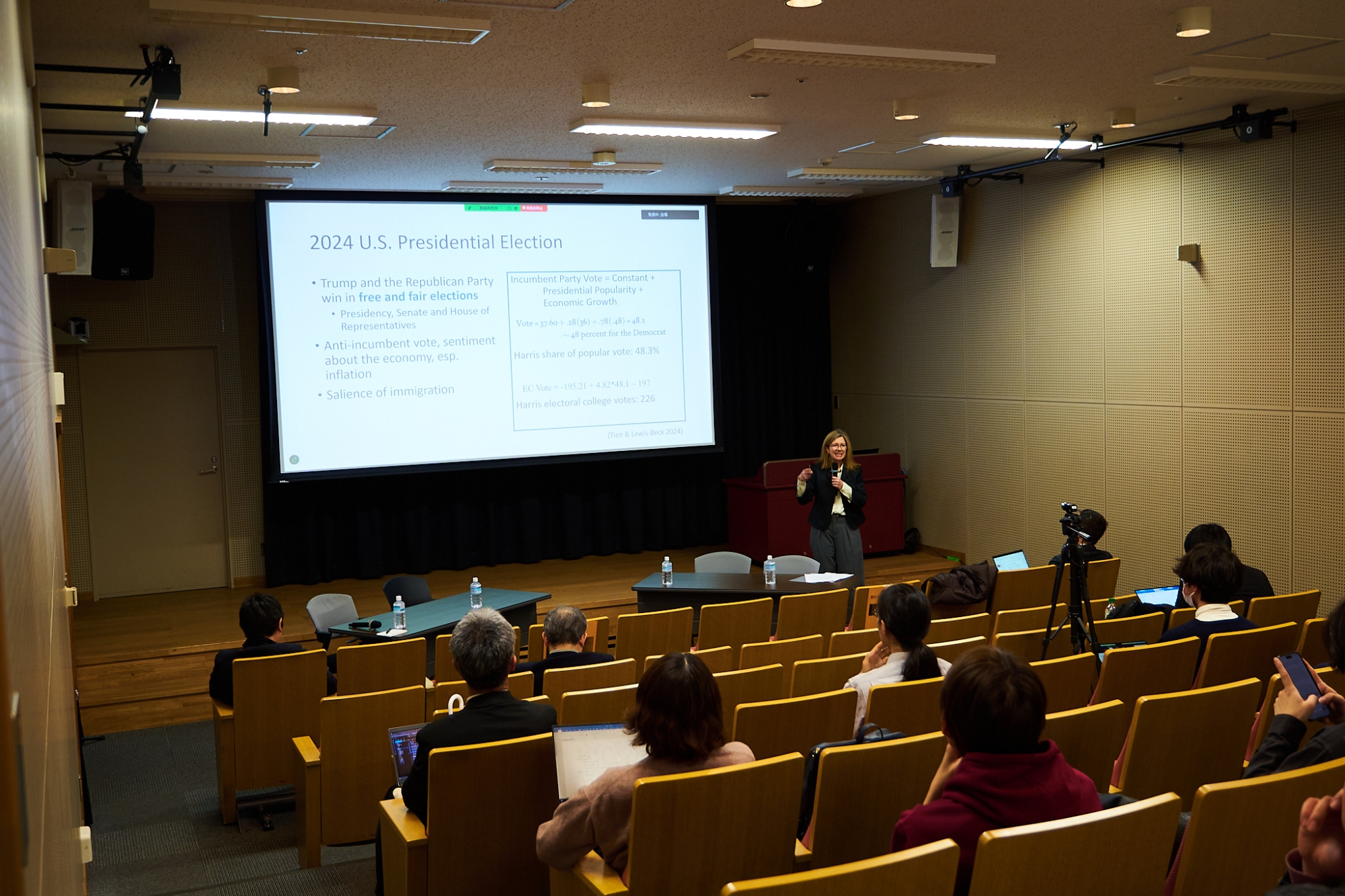Students Share Research Alongside Professors at Political Science and Economics Conference
Fri, Mar 14, 2025-
Tags
The Research Conference of the Waseda Society of Political Science and Economics was held on March 3, 2025 at the Okuma Memorial Tower (Building No. 26) in a hybrid format. This is the first event after the merging of the Waseda Society of Political Science and Economics and the Japan Association of Political Economy. The conference welcomed 11 researchers and graduate students specializing in various disciplines in the social sciences such as political science, economics, and law from Waseda University, Osaka University, Seinan Gakuin University, and the University of Oslo to deliver presentations about their ongoing research projects, moderate discussions, and speak at a roundtable panel. The conference was open to the public, and more than 60 participants, including students and researchers from Waseda and other universities, joined the event both offline and online.
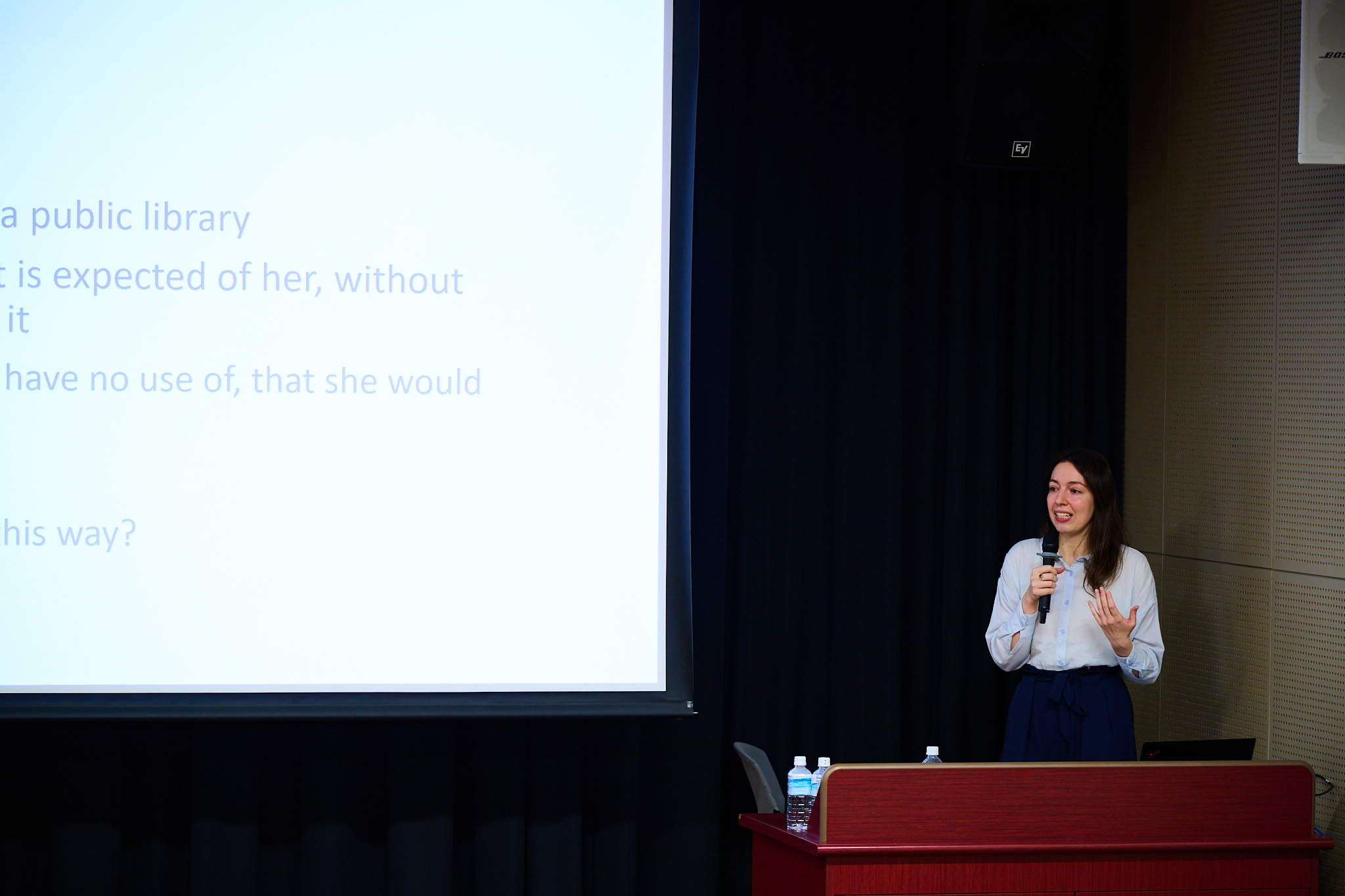
Ph.D. student Clara Brigitta Riegler presenting.
The program of the one-day research conference had 3 main panels consisting of 2 rounds of presentations and a panel discussion. The first panel discussed the concept of distributive justice and included presentations made by two Ph.D. students from Waseda’s Graduate School of Political Science. Both of them specialize in political thought and are interested in topics such as justice, egalitarianism, and pluralism. In the presentation “The Family as Part of the Basic Structure: a Re-examination,” Daisuke Kurata examined Susan Okin’s critique of John Rawls’ work and added his own critique of Rawlsian theory with regard to the structure of caring relationships within the family. In the presentation “Self-Respect, Stability, and Distribution in Liberal Democratic Societies,” Clara Brigitta Riegler discussed the relationship between self-respect, stability, and distributive justice in liberal democratic societies and argued that pro-social behaviors should be encouraged by the institutional framework, with the help of a thought experiment.
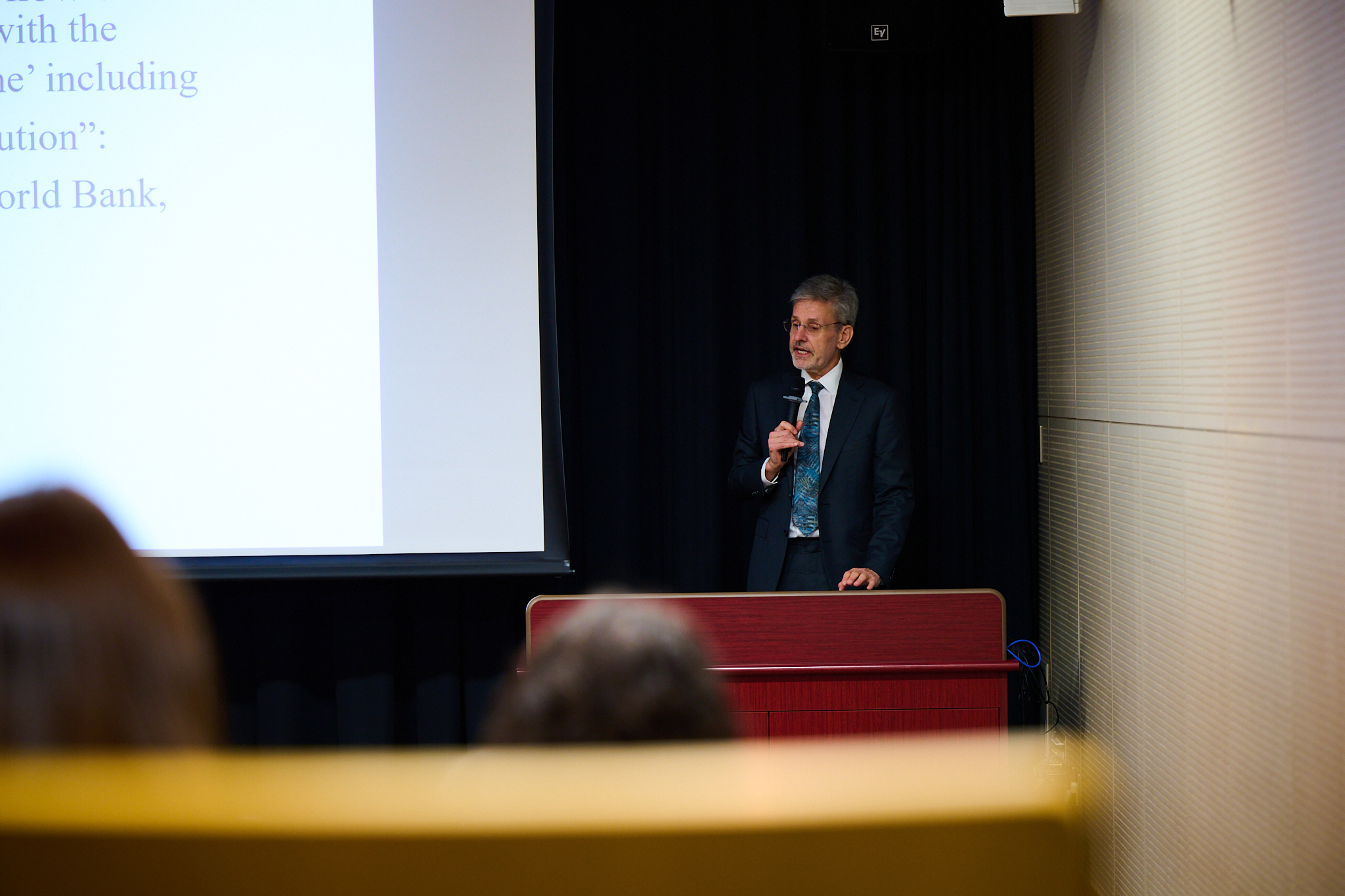
Professor Andreas Føllesdal from the University of Oslo explaining his research.
The second panel of the conference titled “What to Think about When Thinking about Global Constitutionalism” welcomed three researchers to discuss issues under the theme of global constitutionalism from political, economic, and legal dimensions. In the presentation “Global Constitutionalism – A Very Modest Defense?” Professor Andreas Føllesdal from the University of Oslo provided a general background of certain relevant issues for political economists to think about, such as the balance between human rights and market freedom, with the help of the example of the WTO system. In the presentation “We Are Not the People: Destituent Power in Global Constitutionalism,” Professor Yota Negishi from Seinan Gakuin University raised the concept of “destituent power,” which deactivates political order by excluding marginalized peoples through conspiracy between constituent and constituted powers and proposed a five-layer framework addressing the multilateralism of atonement. In the presentation “Constituent Power? Some Perspectives from Japan,” Ayaka Doyle, Research Associate, introduced a number of traditional theories on constituent power, discussed implications of two schools of thought, and referred to the notion of constitutional compatriots. At the end of the three presentations, Associate Professor Hinako Tanaka from Osaka University served as the moderator and raised various questions for the presenters to discuss their research in more detail.
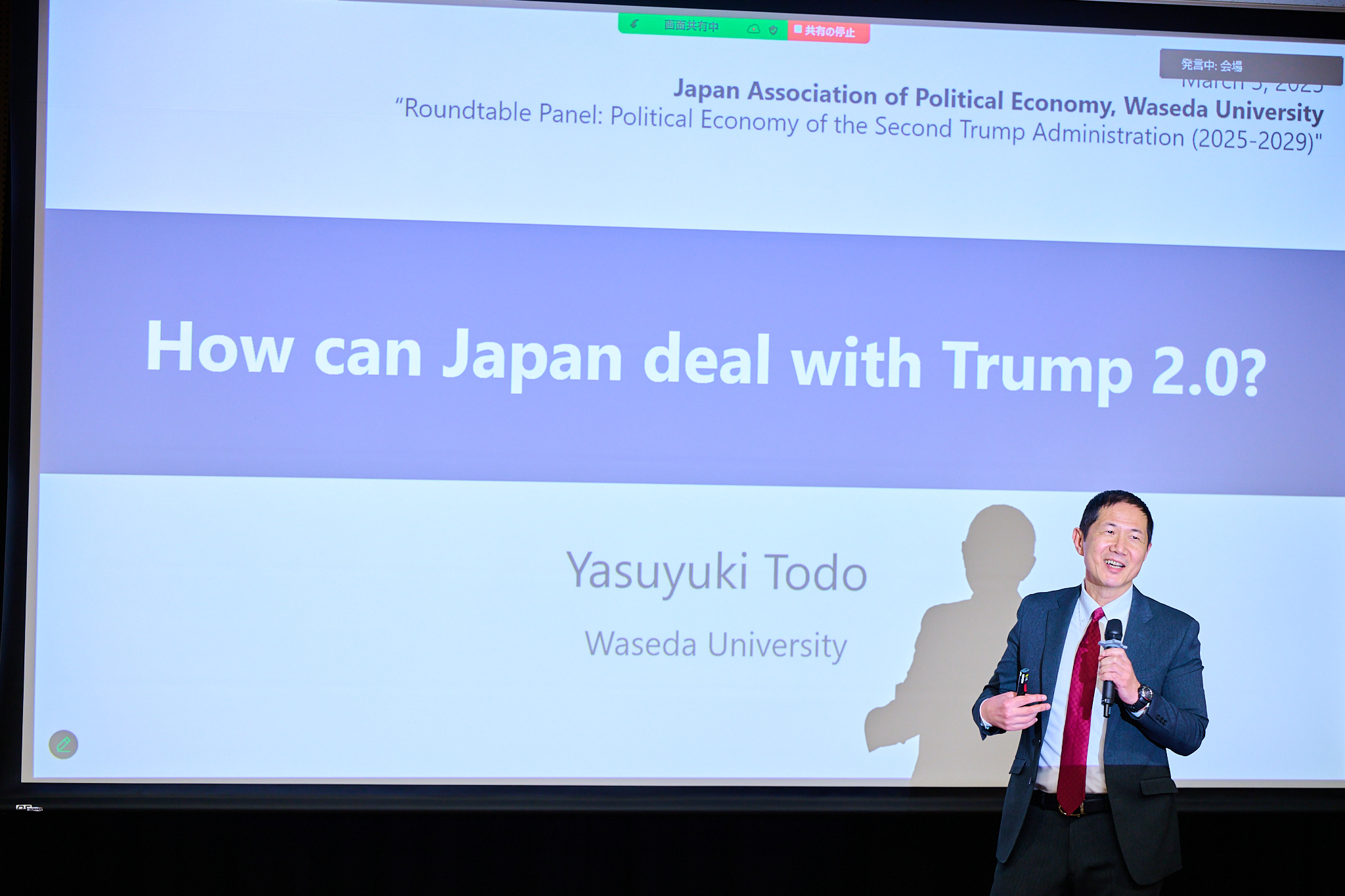
Professor Yasuyuki Todo giving his presentation.
The third panel was a roundtable discussion titled “Political Economy of the Second Trump Administration (2025-2029)” where professors from Waseda’s Faculty of Political Science and Economics served as panelists and shared their observations and thoughts based on their own areas of expertise in political science and economics. To begin, Professor Masato Shizume gave an opening talk by summarizing the inaugural address of President Trump given on January 20, 2025, and the “Trump Doctrine 2.0.” Following his opening talk, Associate Professor Marisa Kellam made a presentation “The Implications of ‘Trump 2.0’ for Democracy in America,” and Professor Yasuyuki Todo then gave the presentation “How Can Trump Deal with Trump 2.0.” Following this, Associate Professor Shuhei Kurizaki gave a talk on the architecture of international order and institutions, and Associate Professor Yuriko Takahashi gave the presentation “Trump 2.0 and Immigration: Implications for Latin America.”
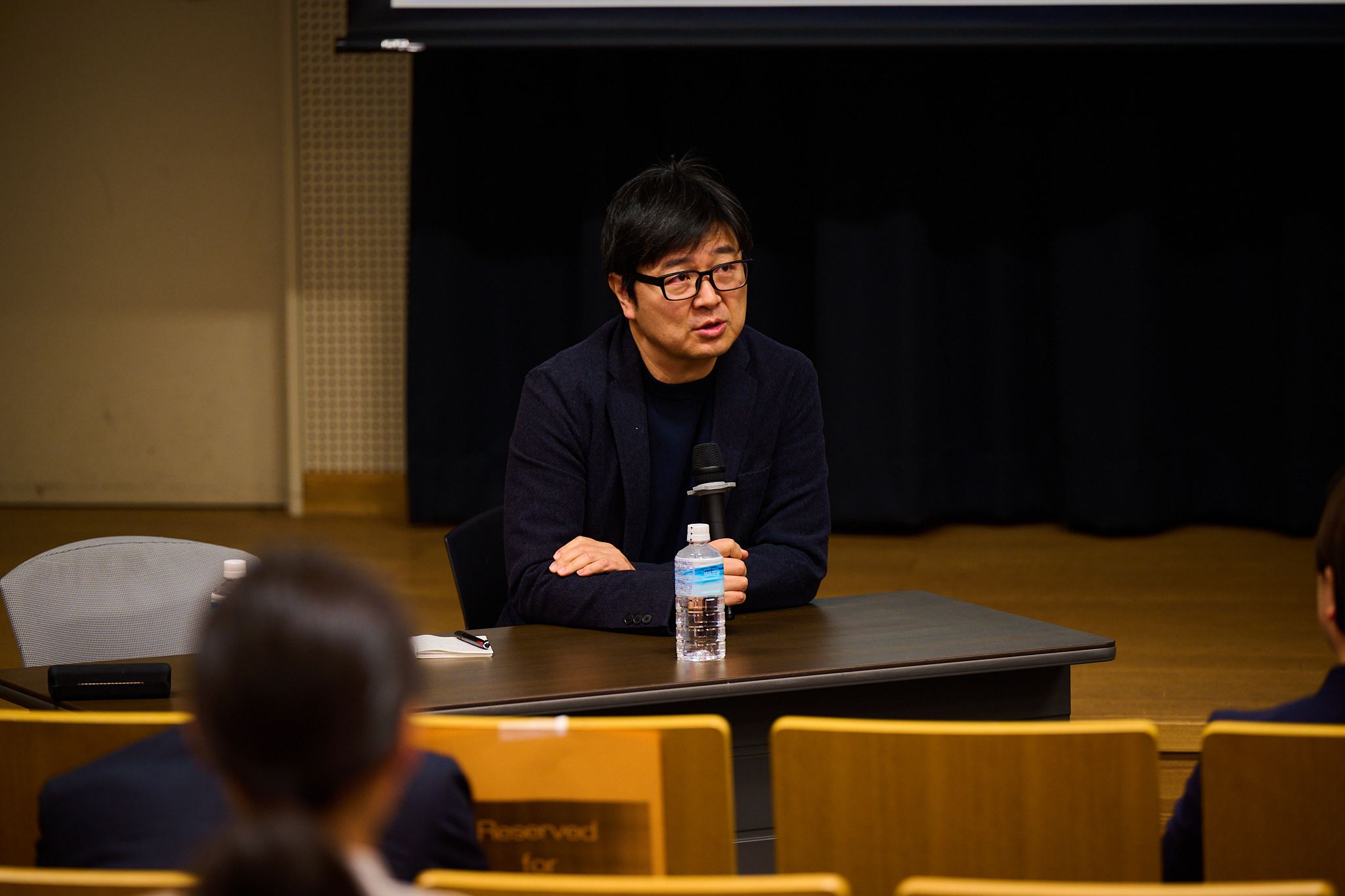
Associate Professor Shuhei Kurizaki during the roundtable discussion.
To conclude the event, the professors joined in a roundtable discussion with each other moderated by Professor Shizume and answered open questions such as “Why did Trump get majority support in the 2024 election?” “What would be the consequences of the Trump administration declaring that it will no longer provide (or at least reduce the US commitment to) global common goods?” and, “If we speculate about the post-Trump era, what kind of possibilities can we see?” Through the helpful lenses of comparative politics, international relations, and development economics, the panelists touched upon both domestic U.S. politics and international politics, addressed the roles of different political actors, and considered various political and economic factors. They analyzed situations in the past and present and gave insights into possible future trends, making the dialogue both retrospective and forward-looking.
The Waseda Society of Political Science and Economics aims to promote integration of research fields in the social sciences and contribute to collaboration among institutions and social science researchers. This research conference allowed the participants to not only showcase their research outcomes through presentations but also to discuss each other’s works-in-progress and receive feedback during Q&A sessions. In particular, young researchers including two Ph.D. students were given an opportunity to present their doctoral research and network with more experienced academics. Because the presenters came from various affiliations, they could not only receive detailed feedback from those specializing in close research areas but also receive helpful comments from those who have different academic backgrounds and perspectives. This could help them identify potential areas of improvements before submitting or revising their works for publication. Moreover, because the presenters came from various institutions, they could become familiar with interesting research topics and different research methodologies. This could help them explore research interests and expand potential research projects. Also, for student/researcher participants who were not presenting, they could learn from the presenters’ research design and reflect on their own research.
As a Ph.D. student and young researcher specializing in political science and comparative politics, I believe that although social science researchers try to apply scientific methods to describe and explain social phenomena, we inevitably need to make some personal judgement for research design and methodology. Therefore, an important but challenging task of social science researchers is to explain our methodological decisions, recognize the limitations in our research design, and think about potential ways to improve them. Presenting works and networking with others in communities like this help us tackle such challenges as we can receive constructive comments, have access to external perspectives, and engage in interdisciplinary dialogues.
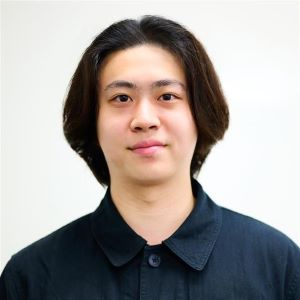 This article was written by the following Student Contributor:
This article was written by the following Student Contributor:
Peter Chai (Kai Shibata)
Graduate School of Political Science


